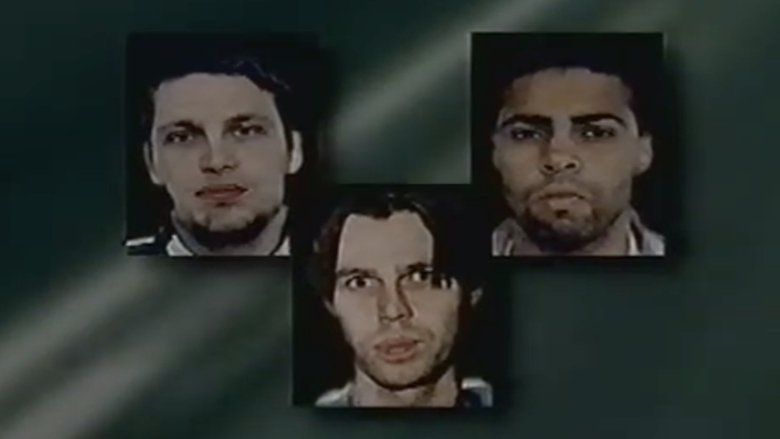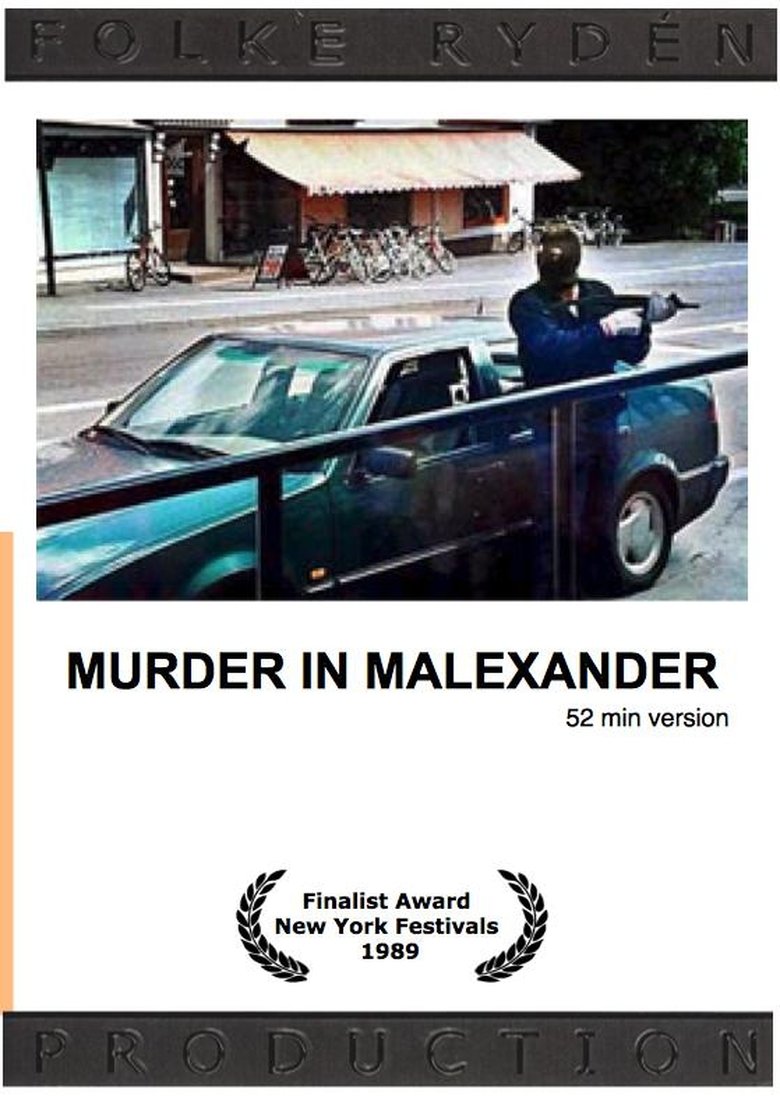Loading


Murder in Malexander
Genres
DocumentaryCrime
Overview
Depicts the controversial double police murder, involving neo-nazism and a theatre project by one of Scandinavia's most celebrated playwrights. The film traces a complex and fascinating chain of events leading up to the fatal climax in the picturesque small town of Malexander, Sweden.
Details
Budget
$0
Revenue
$0
Runtime
97 min
Release Date
2001-05-24
Status
Released
Original Language
Swedish
Vote Count
1
Vote Average
8
Cast
Meet the talented actors who bring the movie to life.
Tony Olsson
Self/Perpetrator/Actor in 7:3
Lars Norén
Self/Director/Writer of 7:3
Isa Stenberg
Self/Producer of 7/3
Bruno Årfors
Narrator
Gunnar Engström
Self/Executive Swedish Prison & Probation Service
Jackie Arklöv
Self/Perpetrator
Andreas Axelsson
Self/Perpetrator
Kenneth Eklund
Self/Local Police Head
Pernilla Rask
Self/Bank Cashier
Astrid Gladh
Self/Robert Karlström's Mother
Annelie Ljungberg
Self/Olle Borén's Partner
Cecilia Borén
Self/Olle Borén's Daughter
Lars-Åke Lundberg
Self/Priest
Reine Brynolfsson
Self/Actorin 7:3
Eva Söderlindh
Self/Prompter in 7:3
Maria Curman
Self/SVT Drama
Thomas Lyrevik
Self/CEO Riksteatern
Bob Pettersson
Self/Local Police Kisa
Sonny Björk
Self/Police Forensic
Peter Johansson
Self/Psychologist Kumla Prison
Henrik Belfrage
Self/Prof. Criminology
Mats Nilsson
Self/Prisoner/Actor in 7:3
Magnus Fransson
Self/Witness of Motorcycle
Jan Hermansson
Self/Bank Executive
Lars Petersson
Self/Photo Shop Owner Kisa
Similar Movies
Explore movies similar to this one that you might also enjoy.
5.0
Hitler: The Comedy Years
A documentary about the portrayal of Adolf Hitler in popular culture.
2007-05-10 | en
4.5
100 Years of the UFA
The intricate history of UFA, a film production company founded in 1917 that has survived the Weimar Republic, the Nazi regime, the Adenauer era and the many and tumultuous events of contemporary Germany, and has always been the epicenter of the German film industry.
2017-08-28 | de
5.7
Who was Hitler
Hitler's biography told like never before. Besides brief historical localizations by a narrator, only contemporaries and Hitler himself speak: no interviews, no reenactment, no illustrative graphics and no technical gadgets. The testimonies from diaries, letters, speeches and autobiographies are assembled with new, often unpublished archive material. Hitler's life and work are thus reflected in a unique way in interaction with the image of the society in the years 1889 to 1945.
2017-11-16 | de
6.0
Repetitioner
The theatre 7:3 project was conducted at the Tidaholm prison 1998-1999. What started as an artistic experiment, ended up in police killings at Malexander. The process in the prison were filmed during 6 months.
2005-11-02 | sv
7.0
Kids On Ice
Quiet towns across rural Australia are in the grip of an Ice epidemic. Major international drug cartels are working with local outlawed motorcycle gangs to push crystal meth to a captive market of children.
2014-10-21 | en
8.0
Poland 1939: When German Soldiers Became War Criminals
September 1st, 1939. Nazi Germany invades Poland. The campaign is fast, cruel and ruthless. In these circumstances, how is it that ordinary German soldiers suddenly became vicious killers, terrorizing the local population? Did everyone turn into something worse than wild animals? The true story of the first World War II offensive that marks in the history of infamy the beginning of a carnage and a historical tragedy.
2019-08-31 | de
6.5
The Dead Nation
A documentary-essay which shows Costică Axinte's stunning collection of pictures depicting a Romanian small town in the thirties and forties. The narration, composed mostly from excerpts taken from the diary of a Jewish doctor from the same era, tells the rising of the antisemitism and eventually a harrowing depiction of the Romanian Holocaust.
2017-08-25 | ro
7.5
Fascism in Colour
After the World War I, Mussolini's perspective on life is severely altered; once a willful socialist reformer, now obsessed with the idea of power, he founds the National Fascist Party in 1921 and assumes political power in 1922, becoming the Duce, dictator of Italy. His success encourages Hitler to take power in Germany in 1933, opening the dark road to World War II. (Originally released as a two-part miniseries. Includes colorized archival footage.)
2006-01-01 | en
8.0
Code Name Lucy: Spies Against Nazis
The greatest secret of the Second World War has remained a mystery for the last 80 years: a Jewish Communist, Sandor Rado, led a spy network that proved essential to the victory of Allied Forces. Rado received details of strictly confidential strategies from the highest echelons of the Nazi State through Rudolf Roessler, a dedicated anti-Nazi he'd only known as code name "Lucy." Aided by key German industry leaders, Roessler transmitted timely information from high-ranking collaborators within the German army headquarters. Despite their achievement, Rado, Roessler and their sources remained unacknowledged heroes until today. Thanks to the recent declassification of secret archives, we are now able to step behind the scenes of this incredible story.
| fr
7.1
Man on the Roof
Detective Martin Beck investigates the grisly murder of a police Lieutenant in his hospital room, he soon realises the urgency of the case when it turns out the killer may hold a hatred for all policemen.
1976-10-01 | sv
0.0
Le Temps des assassins
1962-01-01 | fr
6.0
Opus pro smrtihlava
1984-01-01 | cs
0.0
News Without A Newsroom
As local newsrooms vanish, "News Without a Newsroom" explores journalism's uncertain future in the digital age. Through powerful stories and expert insights, the film examines the collapse of traditional media, the rise of misinformation, and the fight to preserve truth, trust and accountability in an era of disruption.
2025-04-11 | en
6.5
Forbidden Films
Between 1933 and 1945 roughly 1200 films were made in Germany, of which 300 were banned by the Allied forces. Today, around 40 films, called "Vorbehaltsfilme", are locked away from the public with an uncertain future. Should they be re-released, destroyed, or continue to be neglected? Verbotene Filme takes a closer look at some of these forbidden films.
2014-03-06 | de
6.1
The Underworld Story
A blacklisted reporter brings his shady ways to a small-town newspaper after being fired from a big city daily.
1950-07-26 | en
0.0
Nazi-Karrieren in der DDR?
It was a foundational myth of the GDR that it was anti-fascist and free of Nazis. But was that really the case? The film takes a critical look on the actual way the brown heritage was dealt with in the GDR.
2016-11-29 | de
7.7
Avant la catastrophe - La Chute de la République de Weimar (1930-1933)
2022-10-21 | fr
6.0
Hitler's Junkies
In Third Reich, the abuse of drugs made commanders and soldiers feel invincible. The Führer himself took them on daily basis. This is the unbelievable story of the D-IX project and of methamphetamines, which, abundantly furnished to soldiers, changed the course of history.
2015-12-11 | fr
0.0
Berlin - Paris: Die Geschichte der Beate Klarsfeld
With her slap of the Federal Chancellor Kurt Georg Kiesinger in 1968, Beate Klarsfeld abruptly got known worldwide. The film highlights the significance of this act and its background. Beate Klarsfeld, born in Berlin in 1939 as Beate Künzel, is primarily known to people as "the woman with the slap" and as the Nazi hunter. In 1960 she went to Paris and met her future husband Serge Klarsfeld, whose father was deported to Auschwitz and murdered there. She was confronted with the darkest part of German history, about which she had learned nothing at school. Serge gave her books to read and made her actively deal with them. Since then, she has not let go of dealing with the crimes of the Nazi era. For them, it was always about "responsibility, not guilt".
2011-09-08 | de
0.0
Stolen Children
June 1941, during World War II. Reichsführer-SS Heinrich Himmler orders the mass abduction of particularly well-bred young children from Poland and the occupied territories of the Soviet Union in order to be educated in German culture, by both state schools and German families…
2020-03-11 | de